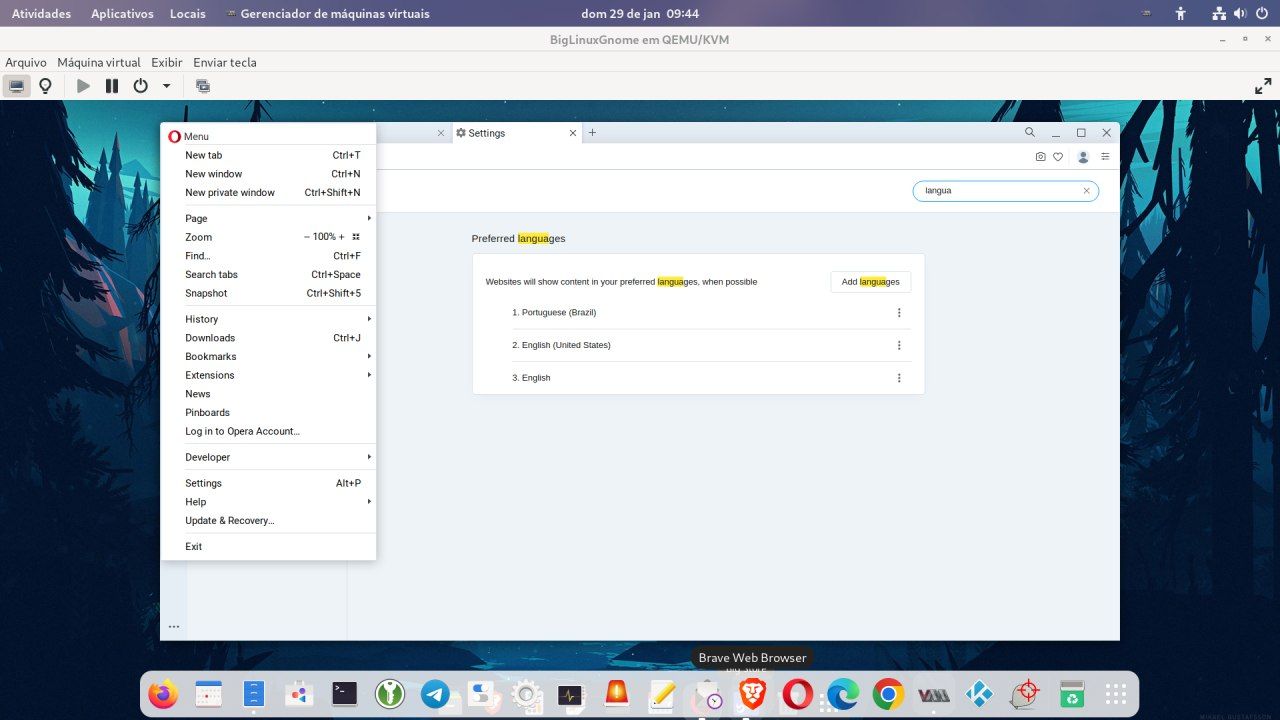Can't change UI language. No option "Display opera in that language"
-
pankon last edited by
hi
the same problem here.
manjaro linux 21.3.7.
please help my english is bad. -
frankgz34 last edited by
hello I have problems with changing the language of opera to Spanish it does not leave me there is no option to make it change the language it is the last update because before it did leave
-
the-codifier last edited by
I had the same issue when I recently installed Opera Stable on Fedora 36 KDE. My native language is spanish, so I will use this language on this tutorial. Probably it will work for all Linux distros.
- Go to this route on your File Manager /usr/share/applications
- In this route, you find many files with .desktop extension. These are the icons you use to open the programs. Find the Opera Browser one (usually called opera.desktop)
- Right click on it and open with your favorite text editor (I use Kate in KDE)
- The first section must look like these
[Desktop Entry] Version=1.0 Name=Opera GenericName=Web browser Comment=Fast and secure web browser TryExec=opera Exec=opera %U Terminal=false Icon=operaLocate the line Exec
5. Add the text lang=your language after the word opera. Example for spanishExec=opera --lang=es %U- Write the --lang flag in all places where you find Exec on the file
- Save the changes on file. Probably the text editor claim you for the super user (root) password. Type it.
- Double click on Opera icon. Your browser now opens on the language you selected.
The reason of this is: Opera is charged with all the languages, but the instruction that launches must be declared with the flag --lang to be opened on the language you want.
I hope I have been helpful.
-
mauermer last edited by
The same here with Kubuntu 22.10. Thank you very much, it worked.
Regards from Germany.mauermer
-
pmG4469 last edited by
I have the same issue, I am on Fedora Linux 37 and I downloaded the opera-stable_94.0.4606.38_amd64.rpm installation file
-
saulodebaco last edited by
Same here. POP OS 22.04 LTS. The trick suggested by @the-codifier did not work.
-
A Former User last edited by
Hi
The problem continues on Opera-Stable Version: 94.0.4606.76 for Linux. Tested on VM in several Linux distributions and with the same problem and not changing the requested language. keeping only the language in English
Can the developers of this browser fix this problem, gentlemen forum administrators?

-
burnout426 Volunteer last edited by burnout426
I did some testing. "Display Opera in this language" option isn't available in Chromium-based browsers on Linux (like Chrome, Chromium, Vivaldi, and Opera). It's available on the Windows versions though.
With that said, on Linux, you have to use the
--lang=codecommand-line switch.After adding German to
opera://settings/languagesand moving it to the top, I closed Opera and tested--lang=dewith Opera and it works as expected. The UI was in German. This also worked for me in Vivaldi. I couldn't get it to work for Chrome and Chromium though for some reason. I tested on Linux Mint Cinnamon 21.1.On a side, I tried setting
app_localetodein the "Local State" file in the profile folder, which seems to be what Windows does for the "Display Opera in this language" option, but that didn't help. So, I guess it's indeed required to use the --lang command-line switch. -
saulodebaco last edited by
@burnout426 Many tks, friend. The option --lang=pt-BR worked like a charm!
To make it easier I have added this to file /usr/share/applications/opera.desktop/
Exec=opera --lang=pt-BR %U -
scitari last edited by
Heja,
The Opera browser I have running under Linux (Linuxfs, Ubuntu-based), is missing the option to change browser/interface language.
The option I have with Opera under Windows 10 (= selecting browser language in "preferred languages" within settings) seems to be missing.
Google Search didn't really reveal promising answers.
What do I need to do to change Opera language?
Best regards
Christian -
scitari last edited by
@leocg Yes, thanks, did, I understand the workaround, but in my case Opera is set-up in a snap, and editing files as root in a read-only environment is actually not really user-friendly.
Having the same browser setting in the Linux version as in the Windows version would likely help adoption by other users. Just a gentle nudge to Opera developers.
Best
Christian -
reinaldofox last edited by leocg
Opera cares so much about filling the app with nasty and unnecessary things and doesn't pay attention to such a basic and crucial thing.
-
Saragoo last edited by
OK, there is something that may work.
I opened my filemanager (Nemo or Thunar or ...) with the terminal (sudo nemo) and then i go to /usr/share/applications
Right-click on Opera and open the attributes menu (in German "Eigenschaften", i do not know if the translation is correct).
Change the command opera %U into opera --lang=de (de for german, choose your language)
Close this. Now Opera should open in the correct language. I hope it works. -
Saragoo last edited by
Tried to post a solution here, but Opera Forums doesn't want to publish it. Only thing Opera cares is to place promotion into the Browser.
-
philou-69210 last edited by
@saragoo Hello, this workaround was already post here. Developers of Opera don't take care of their Linux Users. It's a shame.
-
HomeStudiocz last edited by
yes this work mee use Endevvour OS and only rewirite to
Exec=opera --lang=cs %U save it and run opera and opera run with my native language czech
-
Referenced by
 diezi
diezi -
Referenced by
leocg
-
kocis2023 last edited by
@philou-69210 In Artix with openrc, it was enough to click PM on the Opera icon on the desktop and in the attributes of this icon, complete the following command: exec=opera --lang=pl %U.
And it works. It turned out that there was no need to enter the system.